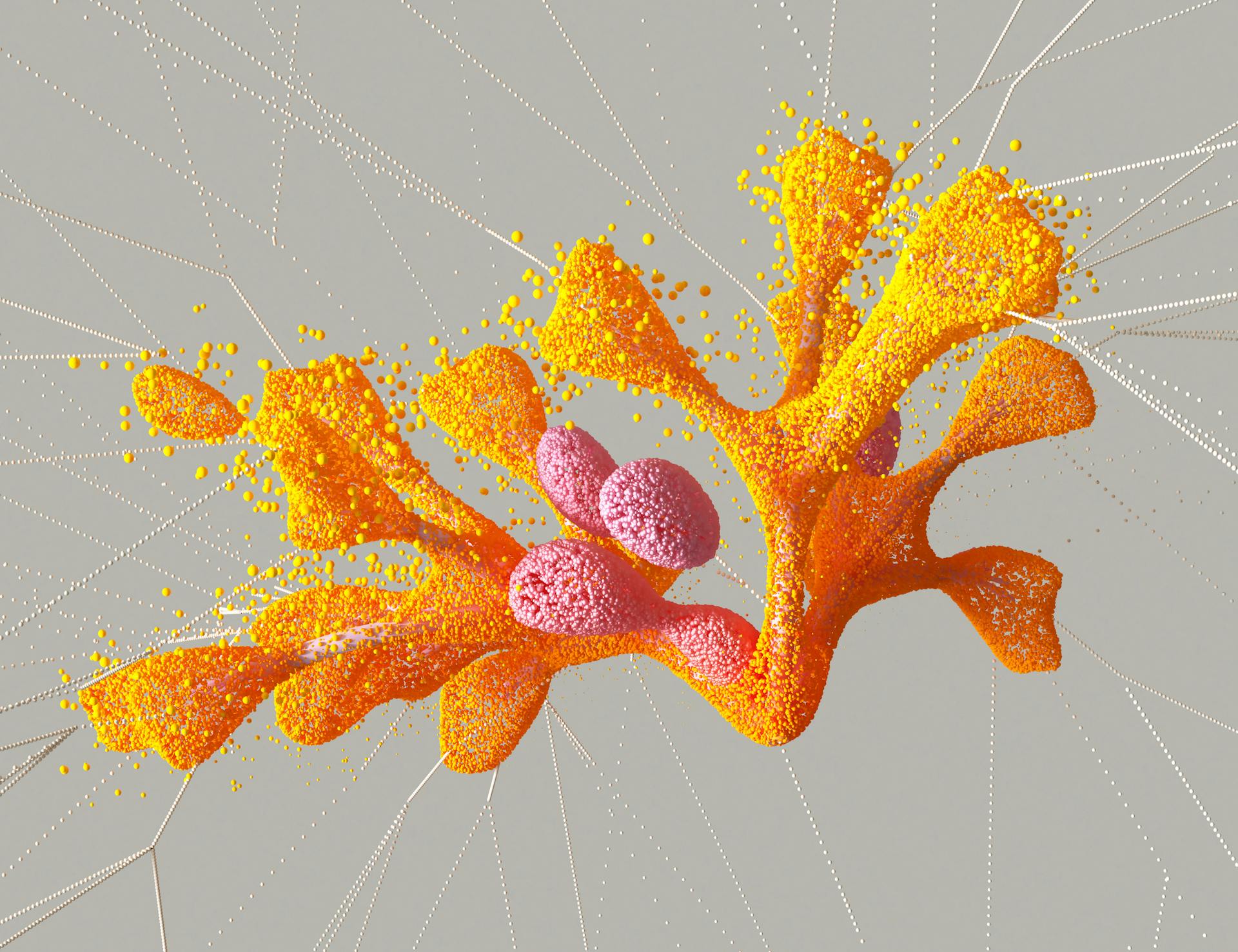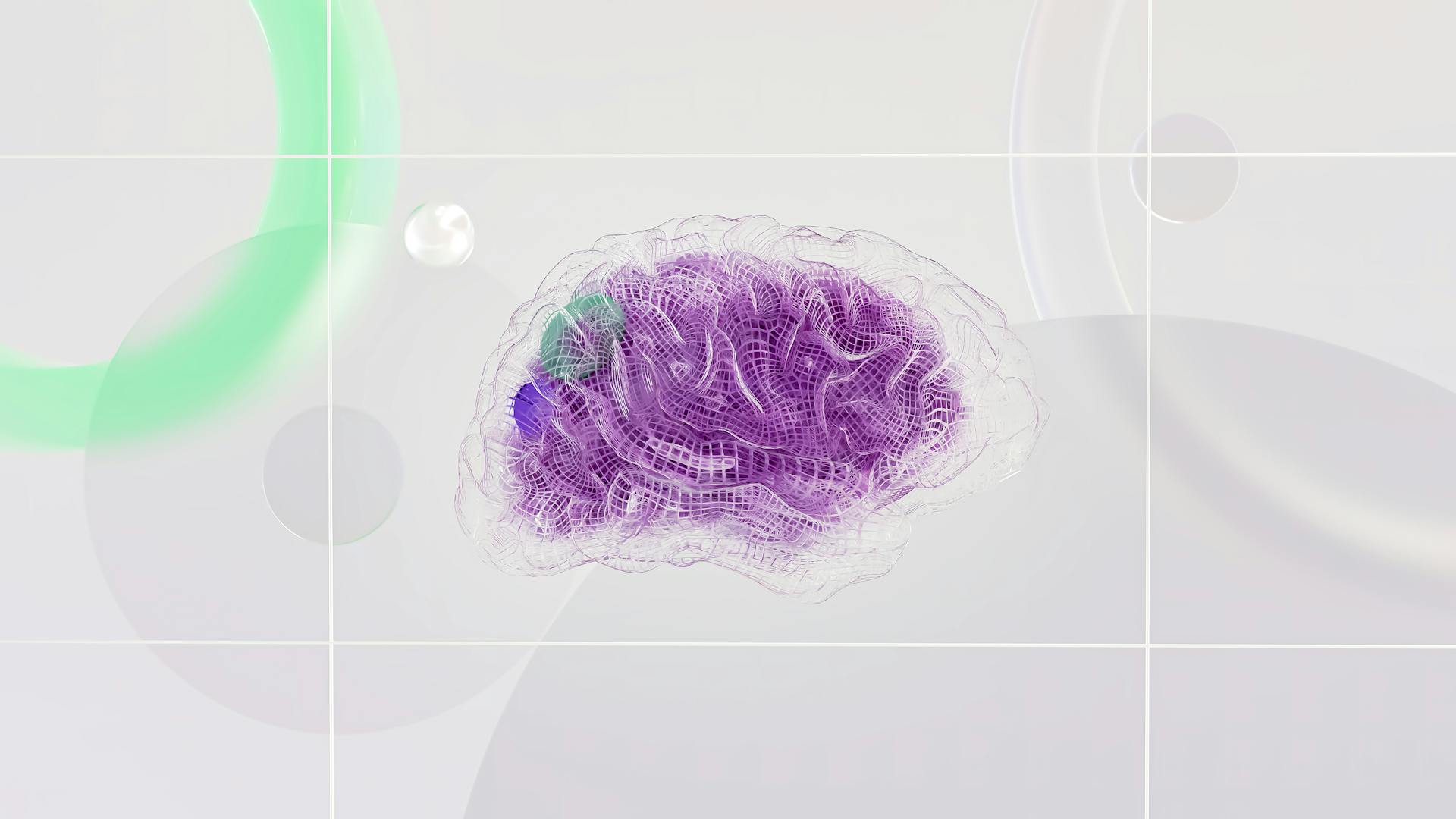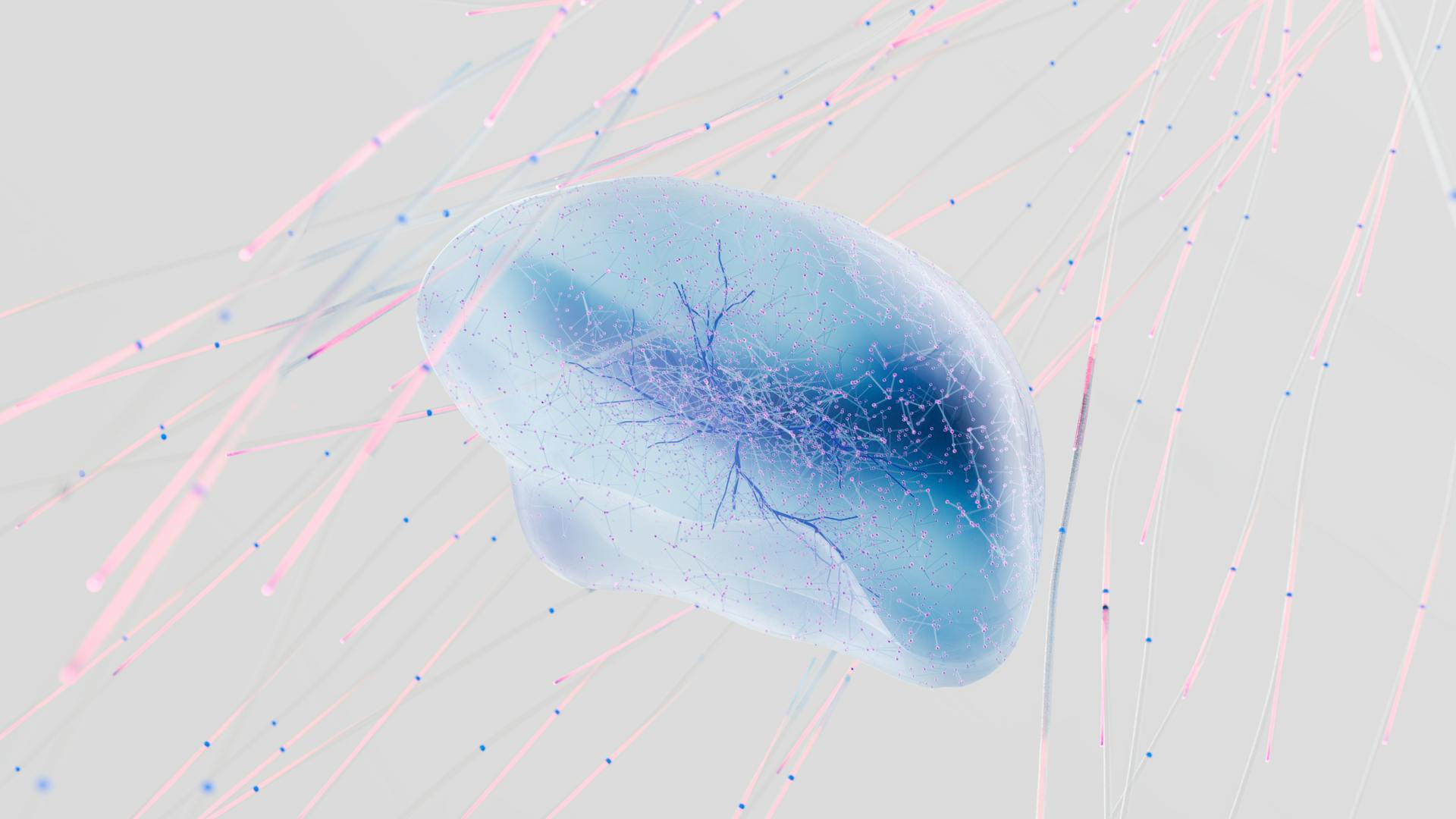
Andrew Ng's Coursera Deep Learning Specialization is a game-changer for beginners. This comprehensive course is designed to help you master the fundamentals of deep learning.
The specialization consists of 5 courses, each focusing on a specific aspect of deep learning. You'll learn about neural networks, convolutional networks, and more.
Andrew Ng, a renowned AI expert, is the instructor of this course. He's a professor at Stanford University and a co-founder of Coursera.
Recommended read: Machine Learning Stanford University Andrew Ng
About the Specialization
The Deep Learning Specialization is a 5-course program that will help you understand the capabilities, challenges, and consequences of deep learning and prepare you to participate in the development of leading-edge AI technology.
The specialization is created by Andrew Ng, Kian Katanforoosh, and Younes Bensouda Mourri, a team of experts in the field of machine learning and AI. Andrew Ng is a pioneer in machine learning and online education, and has changed countless lives through his work in AI.
The courses are designed to build and train neural network architectures, including Convolutional Neural Networks, Recurrent Neural Networks, and Transformers, and to apply strategies such as Dropout, BatchNorm, and Xavier/He initialization. You'll also learn how to use Python and TensorFlow to master theoretical concepts and their industry applications.
Here are the 5 courses that make up the Deep Learning Specialization:
- Neural Networks and Deep Learning
- Improving Deep Neural Networks: Hyperparameter tuning, Regularization and Optimization
- Structuring Machine Learning Projects
- Convolutional Neural Networks
- Sequence Models
By the end of the specialization, you'll be able to build and train deep neural networks, implement vectorized neural networks, identify architecture parameters, and apply DL to your applications.
Consider reading: Hidden Layers in Neural Networks Code Examples Tensorflow
What Is the Specialization?
The Deep Learning Specialization is a foundational program that will help you understand the capabilities, challenges, and consequences of deep learning. It's a 5-course series that will prepare you to participate in the development of leading-edge AI technology.
The specialization is designed to help you gain the knowledge and skills to level up your career in AI. It's not just about learning the technical aspects of deep learning, but also about understanding the industry applications and real-world cases.
You'll build and train neural network architectures such as Convolutional Neural Networks, Recurrent Neural Networks, LSTMs, and Transformers. You'll also learn how to make them better with strategies like Dropout, BatchNorm, Xavier/He initialization, and more.
The specialization is led by Kian Katanforoosh, the co-founder and CEO of Workera and a lecturer in the Computer Science department at Stanford University.
Here's a breakdown of what you can expect to learn in the specialization:
- Build and train deep neural networks, implement vectorized neural networks, identify architecture parameters, and apply DL to your applications.
- Use best practices to train and develop test sets and analyze bias/variance for building DL applications, use standard NN techniques, apply optimization algorithms, and implement a neural network in TensorFlow.
- Use strategies for reducing errors in ML systems, understand complex ML settings, and apply end-to-end, transfer, and multi-task learning.
- Build a Convolutional Neural Network, apply it to visual detection and recognition tasks, use neural style transfer to generate art, and apply these algorithms to image, video, and other 2D/3D data.
- Build and train Recurrent Neural Networks and its variants (GRUs, LSTMs), apply RNNs to character-level language modeling, work with NLP and Word Embeddings, and use HuggingFace tokenizers and transformers to perform Named Entity Recognition and Question Answering.
Author of Specialization
The Deep Learning Specialization has been created by a team of experts. Andrew Ng is one of the creators, and he's a renowned pioneer in machine learning and online education.
Andrew Ng has authored or co-authored over 100 research papers in machine learning, robotics, and related fields. Younes Bensouda Mourri, another creator, completed his Bachelor's and Master's degrees from Stanford University.
Andrew Ng is also the Founder of DeepLearning.AI, General Partner at AI Fund, and Chairman and Co-Founder of Coursera. He's had a significant impact on the field of AI, and his work has changed countless lives.
Younes Bensouda Mourri helped create 3 AI courses at Stanford, including Applied Machine Learning, Deep Learning, and Teaching AI.
Broaden your view: An Introduction to Statistical Learning Stanford Epub
Course Details
The Deep Learning Specialization on Coursera is a comprehensive program that's made up of 5 courses. It's designed to help you understand the capabilities and challenges of deep learning, and prepare you to participate in the development of leading-edge AI technology.
You'll build and train neural network architectures, including Convolutional Neural Networks, Recurrent Neural Networks, and LSTMs, using Python and TensorFlow. The Specialization also covers strategies for reducing errors in ML systems, understanding complex ML settings, and applying end-to-end, transfer, and multi-task learning.
Each course in the Specialization is carefully crafted to help you master theoretical concepts and their industry applications. By the end of the program, you'll be able to build and train deep neural networks, implement vectorized neural networks, and apply DL to your applications.
Who Is It For?
The Deep Learning Specialization is a comprehensive program designed for early-career software engineers or technical professionals looking to master fundamental concepts and gain practical machine learning and deep learning skills.

This specialization is perfect for individuals who want to level up their career in the world of AI, and it provides a pathway for doing so by helping you gain the knowledge and skills to participate in the development of leading-edge AI technology.
You'll learn how to build and train deep neural networks, implement vectorized neural networks, identify architecture parameters, and apply deep learning to your applications.
The specialization covers a wide range of topics, including Convolutional Neural Networks, Recurrent Neural Networks, LSTMs, Transformers, and more. You'll also learn strategies for reducing errors in ML systems, understand complex ML settings, and apply end-to-end, transfer, and multi-task learning.
If you're looking to update to the new material, you can reset your deadlines, but be aware that you'll lose your notebook work when you do so.
If this caught your attention, see: So Much for Learn to Code
Specialization Completion Time
The Deep Learning Specialization is a comprehensive program that requires a significant time commitment.
Each of the five courses in the specialization takes a different amount of time to complete.
Course 3 is the exception, taking about 4 weeks to finish, while each of the other courses typically takes 5 weeks.
With a consistent effort of 5 hours a week, you can complete each course in the allotted time.
Related reading: Applied Machine Learning Course
What's Included
The Deep Learning Specialization is a comprehensive program that includes a variety of learning materials to help you master fundamental concepts and gain practical machine learning and deep learning skills.
You'll have access to 15 videos, 5 readings, 1 assignment, and 3 programming assignments in the first course, which covers neural networks and deep learning.
The specialization consists of 5 courses, each with its own set of learning materials. Here's a breakdown of what you can expect in each course:
It's worth noting that the number of videos, readings, assignments, and programming assignments may vary across courses.
College Credit for Specialization
You can earn a recommendation of 10 college credits for completing the Deep Learning Specialization, which can help open up additional pathways to learners interested in higher education.
This credit recommendation is based on ACE recommendations, the industry standard for translating workplace learning to college credit.
To share proof of completion with schools, you'll receive an email prompting you to claim your Credly badge, which contains the ACE credit recommendation.
The decision to accept specific credit recommendations is up to each institution, so it's not guaranteed that they'll accept it.
The course is completely online, so you can access your lectures, readings, and assignments anytime and anywhere via the web or your mobile device.
Worth a look: Credit Assignment Problem
Learning Experience
The Deep Learning Specialization on Coursera has been a game-changer for many learners, and their success stories are truly inspiring.
Learners have reported getting promotions and awards at work, and even transitioning to new roles such as Machine Learning Engineer. This is a testament to the program's effectiveness in helping learners acquire practical skills and knowledge.
The specialization's focus on building and training deep neural networks, as well as its comprehensive coverage of key architecture parameters, has been particularly beneficial for learners. By the end of the program, learners can confidently implement vectorized neural networks and apply deep learning to real-world applications.
One learner even reported being able to describe the inner workings of a prediction model in detail during an Amazon interview, thanks to the program's emphasis on standard techniques and optimization algorithms.
Here are some of the key skills and knowledge areas covered in the Deep Learning Specialization:
- Building and training deep neural networks
- Implementing vectorized neural networks and deep learning to applications
- Training test sets and analyzing variance for DL applications
- Building CNNs and applying them to detection and recognition tasks
- Working with NLP and Word Embeddings
By mastering these skills and knowledge areas, learners can feel confident in their ability to tackle complex deep learning projects and apply their knowledge to real-world problems.
Deep Learning Topics
You'll learn about building and training deep neural networks, which involves identifying key architecture parameters and implementing vectorized neural networks and deep learning to applications.
In the Deep Learning Specialization, you'll study the foundational concept of neural networks and deep learning, including building, training, and applying fully connected deep neural networks.
The specialization covers significant technological trends driving the rise of deep learning, as well as efficient (vectorized) neural networks and applying deep learning to your own applications.
Key topics include building and training RNNs, working with NLP and Word Embeddings, and using HuggingFace tokenizers and transformer models to perform NER and Question Answering.
Here are the courses that cover these topics:
- FFractal AnalyticsCourse
- CCertNexusCourse
- DDeepLearning.AISpecialization
- UUniversity of Virginia Darden School FoundationSpecialization
By the end of the Deep Learning Specialization, you'll be familiar with the capabilities, challenges, and consequences of deep learning and be able to participate in the development of leading-edge AI technology.
Machine Learning Concepts
Deep learning is a type of machine learning that's perfect for building and training neural networks. You'll learn how to identify key architecture parameters, implement vectorized neural networks, and apply deep learning to your applications.
Some of the key skills you'll gain include TensorFlow, Artificial Neural Networks, Convolutional Neural Networks, and Recurrent Neural Networks. You'll also learn about Transformers, Python Programming, and Deep Learning.
Here are some of the specific skills you can expect to gain:
- TensorFlow
- Artificial Neural Networks
- Convolutional Neural Networks
- Recurrent Neural Networks
- Transformers
- Python Programming
- Deep Learning
You'll also learn about backpropagation, optimization, hyperparameter tuning, and machine learning, including transfer learning and multi-task learning.
Machine Learning
Machine Learning is a vast field that has revolutionized the way we approach problem-solving. It's a subset of Artificial Intelligence that enables machines to learn from data and improve their performance on a task without being explicitly programmed.
The Deep Learning Specialization is a foundational program that will help you understand the capabilities, challenges, and consequences of deep learning and prepare you to participate in the development of leading-edge AI technology. This specialization is a 5-course series that covers topics such as neural networks, deep learning, and machine learning.
To get started with machine learning, you'll need to have intermediate Python experience, including basic programming skills, understanding of for loops, if/else statements, and data structures such as lists and dictionaries. You should also have a basic knowledge of linear algebra (matrix-vector operations and notation) and machine learning concepts (how to represent data, what an ML model does, etc.).
The skills you'll gain from this specialization include TensorFlow, Artificial Neural Networks, Convolutional Neural Networks, Recurrent Neural Networks, Transformers, Python Programming, Deep Learning, Backpropagation, Optimization, Hyperparameter Tuning, Machine Learning, Transfer Learning, Multi-Task Learning, and more.
Some of the key topics covered in this specialization include:
- Building and training deep neural networks
- Implementing vectorized neural networks and deep learning to applications
- Training test sets and analyzing variance for DL applications
- Using standard techniques and optimization algorithms
- Building a CNN and applying it to detection and recognition tasks
- Using neural style transfer to generate art
- Applying algorithms to image and video data
- Building and training RNNs and its variants (GRUs, LSTMs)
- Working with NLP and Word Embeddings
- Using HuggingFace tokenizers and transformer models to perform NER and Question Answering
Here are some of the key skills you'll gain from this specialization:
By the end of this specialization, you'll be able to diagnose errors in a machine learning system, prioritize strategies for reducing errors, understand complex ML settings, and apply end-to-end, transfer, and multi-task learning. You'll also gain hands-on experience with popular deep learning frameworks such as TensorFlow and Keras.
Take a look at this: Learning with Errors
Unsupervised
Unsupervised learning is a type of machine learning where the algorithm learns patterns and relationships in data without being explicitly told what to do.
You'll be learning two key unsupervised learning algorithms this week: clustering and anomaly detection. These algorithms can be completed in just 30 minutes each, making them a great introduction to unsupervised learning.
Here are the specific algorithms you'll be covering:
- Clustering (30 minutes)
- Anomaly detection (30 minutes)
You'll also be diving deeper into two more algorithms: k-means and Anomaly Detection. These will take a bit more time to complete, with k-means requiring 180 minutes and Anomaly Detection requiring another 180 minutes.
Broaden your view: Unsupervised Anomaly Detection
Sources
- https://www.deeplearning.ai/courses/deep-learning-specialization/
- https://www.linkedin.com/pulse/andrew-ngs-deep-learning-coursera-specialization-brief-guy-maskall
- https://www.coursera.org/learn/unsupervised-learning-recommenders-reinforcement-learning
- https://www.coursera.org/learn/deep-neural-network
- https://www.coursera.org/specializations/deep-learning
Featured Images: pexels.com

